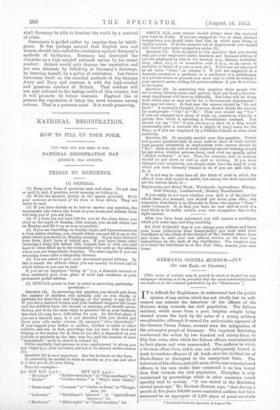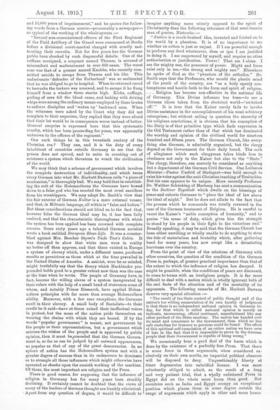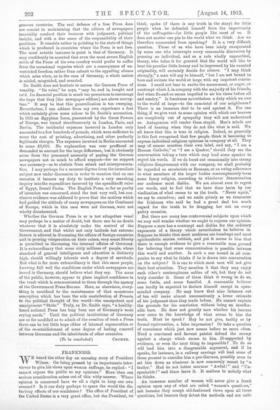'GERMANIA CONTRA MUNDUM.—IV, (Br Turt EARL OF CROMER.) [This series
of articles may be quoted in whole or in part by any newspaper desiring so to do, provided that the usual acknowledgments are made as to the original publication by the " SPECTATOR.".] IT is difficult for Englishmen to understand how the public opinion of any nation which has not wholly lost its self- respect can tolerate the behaviour of the officers of the German Army towards the civil population. The Zabern incident, which arose from a poor, helpless cripple being slashed across the back by the sabre of a young military swashbuckler, although it earned the enthusiastic approval of the German Crown Prince, aroused even the indignation of the submissive people of Germany. The impotent Reichstag condemned the action by two hundred and ninety-three to fifty-four votes, after which the Zabern officers were reinstated in their places, and even commended. The uniform in which a German officer lives, and is also not infrequently buried, is made to condone offences of all kinds save the cardinal sin of disobedience or disrespect to the omnipotent State. The behaviour of the officers,and still more of the non-commissioned officers, to the men under their command is no less brutal than that towards the civil population. Discipline is only maintained by proceedings which in other countries would „speedily lead to mutiny. "It was stated in the Reichstag several years ago," Mr. Harbutt Dawson says, "that during a period of five years 100,000 court-martiadled soldiers had been sentenced to an aggregate of 2,300 years of penal servitude
• Couttuuea from the Spectator of August 7th,
and 16,000 years of imprisonment," and he quotes the follow- ing words from a German source—presumably a newspaper— :is typical of the working of the whole system :— • "Several non-commissioned officers of the First Regiment of the Field Artillery of the Guard were summoned at Berlin before a divisional court-martial charged with cruelly mal- treating their recruits. Not for five years has the German public been shocked by such disgraceful details. One of the ruffians arraigned, a sergeant named Thamm, is accused of misconduct and maltreatment in over 600 cases. The worst case was that of a gunner named Knobbe, who recently com- mitted suicide to escape from Thamm and his like. This unfortunate defender of the Fatherland' was so maltreated that he was obliged to go to hospital. When he returned cured to barracks the torture was renewed, and to escape it he flung himself from a window three stories high. Kicks, ouffings, pulling of ears till the blood came, and lashing with driving whips were among the ordinary means employed by these brutes to enforce discipline and ' waken up' backward men. When the witnesses were asked by the Court why they did not complain to their superiors, they replied that they were afraid that their lot would be in consequence worse instead of better. General surprise is expressed here that this systematic cruelty, which has been proceeding for years, was apparently unknown to the officers of the regiment."
Can such things be in this twentieth century of the Christian era ? They can, and it is the duty of every inhabitant of countries outside Germany to see that the 'poison does not spread, and. to unite in crushing out of existence a system which threatens to wreck the civilization of the world.
We may think that a scheme of government which involves the complete destruction of individuality, and which turns every German into what Mr. Harbutt Dawson calls "a piece of mechanism," is thoroughly bad. We may hold that in establish- ing the cult of the Hohenzollerns 'the Germans have bowed down to a false god who has exacted the most cruel sacrifices 'from his worshippers. We may adopt Dr. Smith's view that the fair exterior of German KultUr is a mere external veneer, 'and that, in Miltonic language, all Within is "false and hollow." But these considerations should not blind us to the fact that, however false the German ideal may be, it has been fully realized, and that the characteristic thoroughness with which the system has been applied has been crowned with complete success. Some sixty years ago a talented German novelist' wrote a book entitled European Slave-We. It was a counter- blast against Mrs. Beecher. Stowe's Uncle Tom's Cabin. It was designed to show that white men were in reality no better a than negroes, and that there existed in Europe a system of slavery which, under a different 'name, produced results as pernicious as those which at the time prevailed in the United States of America. A satirist, were he so minded, might truthfully say that the theory which Hacklander pro- pounded holds good to a greater extent now than was the ease at the time when he wrote. The people of Germany have, in feet, become the willing slaves of a system inaugurated by their rulers with the help of a small band of statesmen some of whom, and notably Prince Bismarck, have applied Hohen- zollern principles with far more than average Hohenzollern ability. Moreover, with a few rare exceptions, the Germans exult in their slavery. A small body of Socialists—to their credit be it said—have at times raised their ineffectual voices in protest, but the mass of the nation pride themselves on 'wearing the chains with which they are bound. If by the words "popular government" is meant, not government by the people or their representatives, but a government which ,mirrors the wishes of the people and is approved by public opinion, then it must be/conceded that the German Govern- ment is, so far as can be judged by all outward appearances, as popular as that of any of the great democracies. In no sphere of action has the Hohenzollern system met with a greater degree of success than in its endeavours to dominate or to strangle all those influences which might otherwise have operated as cheeks upon the smooth working of the machine. Of these, the most important are religion and the Press.
There is good reason for supposing that the influence of religion in Germany has for many years been steadily declining. It certainly cannot be doubted that the views of many of the leaders of German thought are frankly atheistical.
• Apart from any question of dogma, it would be difficult 'to imagine anything more utterly opposed to the spirit of Christianity than the following utterance of that semi-lunatic man of genius, Nietzsche :— " Justice is a crack-brained idea, invented and foisted on to the world by a phantom. It is of no importance to me whether an action is just or unjust. If I am powerful enough to perform any deed whatsoever, then eb ipso I am justified in doing it. I am empowered by myself, and require no other, authorisation or justification. Power ! That am I alone. I am the mighty one, the possessor of power. Might and force exist only in me,—the strong and mighty one." Elsewhere he spoke of God as the "phantom of the orthodox." Dr. Smith says that the Professors, who mould the plastic, mind of the youth of the country, are as a body openly con- temptuous and hostile both to the form and spirit of religion. . . . Religion has become non-effective in the national life of Germany. This Divine influence has been—to use a German idiom taken from the electrical world—'switched off.'" It is true that the Kaiser rarely fails to invoke Divine assistance in the accomplishment of his most arbitrary enterprises ; but without calling in question the sincerity of his religious convictions, it is obvious that his conception of the Deity is of that primitive type which finds expression in the Old Testament rather than of that which has dominated the worship and opinion of the civilized world for ninett.‘en hundred and fifteen years. The German Church, like every- thing else German, is admirably organized, hut the clergy depend on the Government for their daily bread. The oath of allegiance which each clergyman takes binds him to obedience not only to the Kaiser but also to the "State."
The clergy, therefore, can scarcely be considered as anything but a department of the German Civil Service. One Lutheran Minister—Pastor Umf rid of Stuttgart—was bold enough to raise his voice against the anti-Christian teaching of Treitsc But his case appears to be unique. More recently Professor Dr. Walther &hacking of Marburg has sent a communication to the Berliner Ta,geblatt which dwells on the blessings of peace and exhorts Germans to" place the ideal of law above 'the ideal of might." But he does not allude to the fact that the process which he commends was totally reversed in the ease of the German treatment of Belgium. He is careful to vaunt the Kaiser's "noble conception of humanity," and to praise " his sense of duty, which gives him the strength to stand by his people in their fight to the, victorious end." Broadly speaking, it may be said that the German Church has been either unwilling or wholly unable to do anything to stem the tide of materialism and brutality whirl'', after gathering bead for many years, has now swept like a devastating hurricane over the country.
From the point of view of the. relations of • Germany with other countries, the question of the condition of the German Press is, perhaps, of greater practical importance,than that of the extent to which the influence of religion has decayed. It might be possible, when the conditions of peace are discussed, to come to terms with an irreligious people. It is far more difficult to deal with a nation which is wholly ignorant both et the real facts of the situation and of the mentality of its opponents. The following remarks of Mr. Harbutt Dawson deserve very special attention :— "The result of the State control of public thought and of the nation's too willing emasculation of its own faculty of judgment is that there is no independent national opinion in Germany to- day, for that which is Called national opinion is merely an inchoate, unreasoning, official sentiment, manufactured like any other produot of the State machine. The nation has handed over its mind and conscience to the Government, than which no loss safe custodian for treasure so precious could be found. The effect of this spiritual self-immolation of an entire nation we have seen of late in the fact that it is impossible to prove to the German people that their Government is capable of being wrong."
We occasionally hear a good deal of the harm which is done by the existence of a perfectly free Press. That there is some force in these arguments, when considered ex- clusively on their own merits, no impartial political, observer will be disposed to deny. Unquestiolably liberty at times degenerates into unbridled licence. I was most reluctantly obliged to admit, as the result of a long and very patient trial, that a wliolly unfettered Press in Egypt did on the whole more harm than good. But countries such as India and Egypt occupy an exceptional position which places them in some degree outside the range of arguments which apply in other and more homo- geneous countries. The real defence of a free Press does not consist in maintaining that the editors of newspapers invariably conduct their business with judgment, political insieht, and with a due sense of the responsibility of their positions. It consists rather in pointing to the state of things which is produced in countries where the Press is not free. The most notable instance in point is that of Germany. It may confidently be asserted that even the most severe English critic of the Press of his own country would prefer to suffer from the occasional vagaries which are a consequence of un- restricted freedom rather than submit to the appalling abuses which arise when, as in the case of Germany, a whole nation is misled, misguided, and muzzled.
Dr. Smith does not hesitate to accuse the German Press of venality. "Its voice," he says, "may be, and is, bought and to'd. Its financial position is much too precarious to encourage the hope that they [the newspaper editors] are above corrup- tion." It may be that this generalization is too sweeping. Nevertheless, I can adduce from my own experience a fact which certainly gives some colour to Dr. Smith's accusation. In 1885 an Egyptian Loan, guaranteed by the Great Powers of Europe, was issued simultaneously in London, Paris, and Berlin. The incidental expenses incurred in London only amounted to a few hundreds of pounds, which were sufficient to cover the cost of printing, advertising, and other perfectly legitimate charges. The expenses incurred in Berlin amounted to some £8,000. No explanation was ever proffered or demanded to account for the large difference, but it obviously arose from the presumed necessity of paying the German newspapers not so much to afford support—for no support was necessary—as to abstain from attack and misrepresenta- tion. I may perhaps for a moment digress from the immediate subject now under discussion in order to mention that on one occasion it became my duty to institute a very searching inquiry into the expenditure incurred by the spendthrift ruler of Egypt, Ismail Pasha. The English Press, so far as purity of intention was concerned, stood the test very well, but con- clusive evidence was adduced to prove that the motives which had guided the attitude of many newspapers on the Continent of Europe, which in this ease were not German, were not wholly disinterested.
Whether the German Press is or is not altogether venal may perhaps be a matter of doubt, but there can be no doubt whatever that it is absolutely under the control of the Government, and that whilst not only latitude but extreme licence is allowed in discussing the affairs of foreign countries and in pouring vituperation on their rulers, very scant liberty is permitted in discussing the internal affairs of Germany. It is extraordinary that some sixty millions of people, whose standard of general intelligence and education is distinctly high, should willingly tolerate such a degree of servitude. But what is far more extraordinary is that this same people, knowing full well the conditions under which newspapers are issued in Germany, should believe what they say. The mass of the public, however, appear to place implicit confidence in the trash which is communicated to them through the agency of the Government Press Bureau. Here, as elsewhere, every- thing is sacrificed to the maintenance of that monstrous conception which has been the sole contribution of Prussia to the political thought of the world—the omnipotent and omnipresent "State." Truly, as Dr. Smith says, "a healthy toned national Press has long been one of Germany's most crying needs." Until the political institutions of Germany are so far modified as to admit of the creation of such a Press there can be but little hope either of internal regeneration or of the re-establishment of some degree of lasting concord between Germans and the inhabitants of other countries.




































 Previous page
Previous page